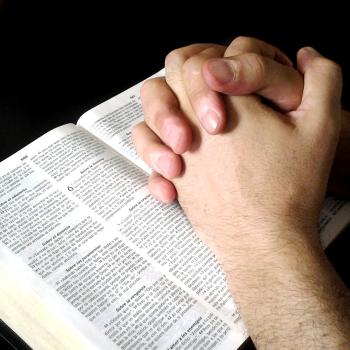Many years ago, when I had just moved to a new church in a new town to serve as pastor, the church held its annual Christmas banquet, which I would be attending for the first time.

Image via Pixabay
My wife and I arrived only a few minutes before it started, and that’s where we learned that you really needed to arrive more like an hour before it started, as the seating was “first come, first served,” and everyone had already arrived early to save seats so that they could sit with their friends and family.
My wife and I walked from table to table, looking for open seats, asking, “Can we sit here?” whenever we found any. And we heard over and over from our new church family, “Sorry! I would, of course, but my friend will be sitting there!” “My brother is on his way!” “I didn’t know you needed a seat, I’ve already saved that for someone!” etc.
It kinda felt like that scene from Forrest Gump when he’s on the bus going to school for the first time and no one will let him sit down. “Seat’s taken!” (in an Alabaman accent).
After this had happened a number of times, I was getting annoyed. Here I was, the new pastor of the church, and there wasn’t a seat for me and my wife at my church’s Christmas banquet!
And to be clear, it wasn’t in any way about me being the pastor and “deserving” to sit anywhere in particular, as I’m happy to sit anywhere, and people always sit with their loved ones at stuff like this. My wife and I were new and still getting to know everyone.
What really bothered me was this: if even the pastor wasn’t being welcomed to sit down, then how well would the church welcome a stranger?
We eventually found seats, of course, and had a wonderful time, and would enjoy many more Christmas banquets with the church family that we loved dearly. But the story has stuck with me, to be certain.
In the parable of the sheep and the goats (Mt 25.31-46), Jesus tells a story that ultimately is a truth about our judgment day, and shows us something about the things that are truly important to God:
“When the Son of Man comes in His glory, and all the angels with Him, He will sit on his glorious throne. All the nations will be gathered before Him, and He will separate the people one from another as a shepherd separates the sheep from the goats. He will put the sheep on His right and the goats on His left.
“Then the King will say to those on his right, ‘Come, you who are blessed by my Father; take your inheritance, the kingdom prepared for you since the creation of the world. For I was hungry and you gave me something to eat, I was thirsty and you gave me something to drink, I was a stranger and you invited me in, I needed clothes and you clothed me, I was sick and you looked after me, I was in prison and you came to visit me.’
“Then the righteous will answer Him, ‘Lord, when did we see you hungry and feed you, or thirsty and give you something to drink? When did we see you a stranger and invite you in, or needing clothes and clothe you? When did we see you sick or in prison and go to visit you?’
“The King will reply, ‘Truly I tell you, whatever you did for one of the least of these brothers and sisters of mine, you did for me.’
“Then He will say to those on His left, ‘Depart from me, you who are cursed, into the eternal fire prepared for the devil and his angels. For I was hungry and you gave me nothing to eat, I was thirsty and you gave me nothing to drink, I was a stranger and you did not invite me in, I needed clothes and you did not clothe me, I was sick and in prison and you did not look after me.’
“They also will answer, ‘Lord, when did we see you hungry or thirsty or a stranger or needing clothes or sick or in prison, and did not help you?’
“He will reply, ‘Truly I tell you, whatever you did not do for one of the least of these, you did not do for me.’
“Then they will go away to eternal punishment, but the righteous to eternal life.”
As always, those of us who have been around a while and who are familiar with the teachings of Jesus need to actively pray for our eyes and ears to be opened, that we would hear afresh what the Spirit is saying; that we would not skim over the passage in the name of familiarity because we already know it so well and feel that we have figured out its truths.
There is much in this passage that is important, but one key idea that I see is this:
We know that Jesus taught us the Golden Rule, where we are to treat others that way that we would want to be treated ourselves (Mt 7.12).
But here, in this parable, Jesus takes things even further than that: we are to treat others the way that we would treat Him.
In fact, Jesus takes the way that we treat others so personally, that He personifies our treatment of others as if it were actually towards Himself. If we feed the hungry, it’s like we’re feeding Him. If we ignore the hungry, we are ignoring Him.
And as one of the areas of Christ’s interest, the way we treat “the stranger” is crucially important to Him.
And of course, it goes far beyond the fairly shallow example of seats at a church Christmas banquet.
Where does the stranger fit into our life?
Are we inviting the stranger in?
Are we welcoming them to our table?
Are we seeking to take care of their needs?
Are we making effort to turn them from stranger to friend?
Are we allowing them to become part of the family?
Or are we ignoring them and their need?
Are we more focused on ourselves?
Are we more comfortable connecting with and caring for our own people?
The implications are broad, and the actual response is varied depending on the context, of course, but the teaching of Christ is clear:
On Judgment Day, the way we treat the stranger is something that He will consider as the way we treated Christ Himself.
This calls us to humility, to other-centeredness, to sacrifice, to generosity.
It calls us to inconvenience and it calls us to invitation, where we don’t passively wait but we actively reach out, calling for the stranger to join us, welcoming them to the family, and treating them like one of us.
When we do this, we please Christ, who has Himself called us to His own table and welcomed us into His family.
When we don’t do this, we are actually in hypocrisy, as we are willing to be welcomed by Him, but not willing to do any welcoming of our own.
So we open our eyes, we look around us, we determine that we will not only reach out to friend and family, but we actively seek the stranger in our midst, and like Christ did for us, we welcome them to join us at our table.
********
If you’re enjoying what you read, you can follow Third Way Christians on Facebook or Instagram, or sign up to get new columns emailed to you here! As well, you can track along with Chris’ church teaching at Meadow Brook Church’s YouTube page!












